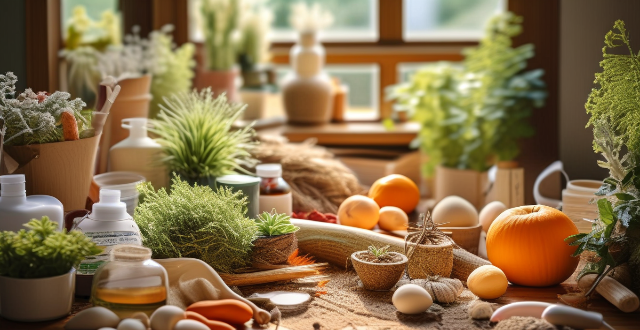Using natural ingredients for homemade cleaners is a popular and eco-friendly choice, but it's important to be aware of the potential risks associated with mixing certain substances. These risks include bacterial growth, chemical reactions, skin irritation, and corrosion. To safely use natural ingredients for cleaning purposes, research their properties and potential interactions, label your cleaners clearly, store them properly, test a small amount before extensive use, and wear appropriate protective gear. By following these tips, you can ensure that your homemade cleaners are effective and safe for both you and the environment.

Are There Any Risks Associated with Mixing Certain Natural Ingredients in Homemade Cleaners?
Introduction
Many people prefer using homemade cleaners made from natural ingredients as they are eco-friendly and cost-effective. However, it is important to be aware of the potential risks associated with mixing certain natural ingredients in homemade cleaners. In this article, we will discuss some of these risks and provide tips on how to safely use natural ingredients for cleaning purposes.
Risks Associated with Mixing Natural Ingredients
Bacterial Growth
Mixing certain natural ingredients can create an environment that promotes bacterial growth. For example, combining vinegar (an acid) with baking soda (a base) can neutralize each other's properties, making it less effective as a cleaner. Additionally, if the mixture is not used immediately or stored properly, bacteria can grow, leading to unpleasant odors and potential health risks.
Chemical Reactions
Some natural ingredients may react with each other when mixed, producing harmful chemicals. For instance, combining bleach (a strong oxidizer) with vinegar (an acid) can release toxic chlorine gas. Similarly, mixing hydrogen peroxide with vinegar can produce peracetic acid, which can irritate the skin and eyes.
Skin Irritation
While natural ingredients are generally considered safe, some people may have allergies or sensitivities to certain substances. For example, essential oils like tea tree oil or peppermint oil can cause skin irritation or allergic reactions in some individuals. It is essential to test a small amount of the mixture on your skin before using it extensively.
Corrosion
Some natural ingredients, such as lemon juice or vinegar, can be corrosive to certain surfaces like marble or granite countertops. Prolonged exposure to these substances can cause etching or discoloration of the surface. Always check the manufacturer's instructions before using any homemade cleaner on specific surfaces.
Tips for Safe Use of Natural Ingredients in Homemade Cleaners
1. Research: Before mixing any natural ingredients, research their properties and potential interactions. This will help you avoid harmful combinations and ensure that your homemade cleaner is effective and safe to use.
2. Labeling: Clearly label your homemade cleaners with the ingredients used and any precautions or warnings. This will help prevent accidental misuse or exposure to harmful substances.
3. Proper Storage: Store your homemade cleaners in airtight containers away from direct sunlight and heat sources. This will help prevent bacterial growth and maintain the effectiveness of the mixture.
4. Testing: Test a small amount of the mixture on an inconspicuous area before using it extensively. This will help you identify any potential issues with the mixture, such as skin irritation or damage to surfaces.
5. Personal Protection: Wear appropriate protective gear, such as gloves and goggles, when handling potentially hazardous substances like bleach or hydrogen peroxide. This will help protect your skin and eyes from irritation or injury.